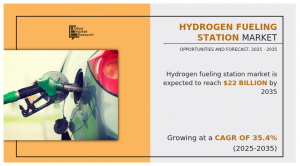
The hydrogen fueling station is built with a wide range of compressors and accumulators to effectively store & fill liquefied or gaseous hydrogen.
PORTLAND, OR, UNITED STATES, March 31, 2023 /EINPresswire.com/ — The concept of a hydrogen fueling station is typically attributed to hydrogen or fuel cell electric vehicles (FCEVs) that provide a practical alternative to zero-emission mobility compared to battery electric vehicles (BEV). The hydrogen fueling station is built with a wide range of compressors and accumulators to effectively store & fill liquefied or gaseous hydrogen. Stations dispense hydrogen as a compressed gas at pressures of 10,000 psi (H70) for light-duty vehicles and 5,000 psi (H35) for all other vehicles.
??????? ?????? ??? ??: https://www.alliedmarketresearch.com/request-sample/8866
The fueling station has a storage tank based on the station’s location and capacity, in which hydrogen can be stored as a liquid, a low-pressure gas, or a high-pressure gas. Presently, governments across the globe are promoting the use of hydrogen-powered vehicles to reduce carbon emissions and save fuel. For instance, in 2019, European Union (EU) started the H2Haul project, which is expected run for five years. This EU-funded project aims to deploy 16 zero-emission fuel cell vehicles at four sites, i.e., Germany, Belgium, Switzerland, and France, by 2024. Moreover, the California Air Resources Board (CARB), Toyota, Shell, and Kenworth started the $82 million Zero-Emission and Near Zero-Emission Freight Facilities (ZANZEFF) project.
According to a new report published by Allied Market Research, titled, “Hydrogen Fueling Station Market,” The hydrogen fueling station market was valued at $1.1 billion in 2025, and is estimated to reach $22 billion by 2035, growing at a CAGR of 35.4% from 2025 to 2035.
Major determinants of the market growth
Strict government regulations to control ever-increasing pollution, surge in R&D activities regarding hydrogen fuel cell technology, and high suitability of hydrogen as fuel have boosted the growth of the global hydrogen fueling station market. However, dearth of fuel infrastructure and high initial cost hinder the market. On the contrary, technological development and high potential in hydrogen fuel cell vehicles along with rise in investment & encouragement in administrative policy framework would open lucrative opportunities in the future.
Covid-19 scenario:
The Covid-19 severely impacted the automotive industry due to prolonged lockdown across the globe and economic crisis that led to reduction in expenditure on next-generation technologies.
Major European countries followed the strict protocols of social distancing measures so as to curb the spread of the virus. This, in turn, reduced the sales of fuel cell electric vehicles.
?????????? ?? ??????? ??? ???????? ??????? ??????? ?????? ?????? – https://www.alliedmarketresearch.com/purchase-enquiry/8866
In addition, the hydrogen fueling station market has witnessed significant growth in recent years, owing to increased demand for improved vehicle performance and the inclination of consumers toward environment-friendly vehicles. Furthermore, the companies operating in the market have adopted partnerships, investments, and business expansions, to increase their market share and expand their geographical presence.
For instance, in October 2021, Linde plc. announced the start of its new hydrogen production facility in Texas. This bought Linde’s total U.S. Gulf Coast hydrogen capacity to approximately 1.5 billion cubic feet per day. This helped them expand their offerings for hydrogen fueling stations across the U.S. Also, in December 2021, ITM Power PLC partnered with Shell, one of the largest oil companies in the world, to construct a hydrogen refueling station (HRS) at the Shell Filling Station, Beaconsfield. This increased its market presence across the UK.
The factors such as stringent government regulations to control increasing pollution, high suitability of hydrogen as fuel, and increase in R&D activities related to hydrogen fuel cell technology supplement the hydrogen fueling station industry growth.
However, high initial expenditure for producing hydrogen and lack of fuel infrastructure are the factors expected to hamper the growth of the market. In addition, technological advancements and future potential in the hydrogen fuel cell vehicle and increase in investments & encouragement in administrative policy framework create market opportunities for the key players operating in the market.
??????? ???????? ?????? (326 ????? ??? ???? ????????, ??????, ??????, ???????) ??: https://www.alliedmarketresearch.com/hydrogen-fueling-station-market/purchase-options
KEY FINDINGS OF THE STUDY
By station type, the large segment dominated the global hydrogen fueling station market in terms of growth rate.
By vehicle type, the commercial vehicles segment dominated the global hydrogen fueling station market in terms of growth rate.
By vehicle technology, the others segment dominated the global hydrogen fueling station market in terms of growth rate.
By delivery method, the on-site segment dominated the global hydrogen fueling station market in terms of growth rate.
The leading players operating in the hydrogen fueling station market are Air Liquide, Air Products and Chemicals, Inc., Ballard Power Systems, Black and Veatch Holding Company, China Petrochemical Corporation, Cummins Inc., FirstElement Fuel, Inc., FuelCell Energy, Inc., H2ENERGY SOLUTIONS LTD, ITM Power PLC, NEL ASA, Nuvera Fuel Cells, LLC, PDC Machines Inc., Shell, Linde PLC, TotalEnergies, and TrueZero.
Allied Market Research
Allied Market Research
+1 800-792-5285
email us here
Visit us on social media:
Facebook
Twitter
LinkedIn
The content is by EIN Presswire. Headlines of Today Media is not responsible for the content provided or any links related to this content. Headlines of Today Media is not responsible for the correctness, topicality or the quality of the content.

